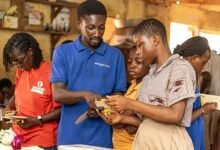Kosmos Innovation Centre sees agric as game changer

The Director of the Kosmos Innovation Centre (KIC) , Mr Benjamin Gyan-Kesse, says it remains focused on the goal of providing opportunities and influencing the agricultural sector with technology and innovations that will attract many young and smart brains into the very important sector of the country’s economy.
He said the decision to focus on agriculture was because the sector had the potential to transform the economy and make the youth, who go into it rich.
“The agriculture space has the potential to make you rich. This is because we have seen companies who will pay just to validate their ideas. It is about how you approach agriculture,” he said in an interview.
“It’s about science and business. You have to have both mindsets and build your skill in that sector. Agriculture has a potential to make you rich, to make the country gain revenue and also help farmers for the progress of the country,” he said.
He said “Our key goal is to create employment and employable skills and as an Innovation Centre. We are glad one has other innovations other than the training to be able to work in a different field,”
He said the Centre was set up with the support of Kosmos Energy, one of the companies involved in oil production in the Jubilee field, when it became clear the oil and gas sector would not create much employment because of the technology involved.
He said, a group of entrepreneurs came together and decided to use their skill set to invite young Ghanaians to let them understand how to build partnerships and set up businesses to solve challenges with a commercial mind.
“We have decided to focus on agriculture because the average age of a farmer is around 57 years. This means food security was going to be a problem in the next 10 years if these same people are farming and unable to increase production.”
Directly over 600 young entrepreneurs have been introduced to the Centre’s training programme. Through the startup programme, we have created over 32 startups.
Some of them are currently operating beyond Ghana. We have one of our companies operating in Zimbabwe, Togo, Burkina Faso, Nigeria and also going into Benin as well. This tells us that within the shortest possible time we have been able to impact this place.
In Ghana, the centre is impacting more than 20,000 farmers with businesses in the space of agriculture and innovation. We have created directly 360 jobs. We are also into the SMEs sector.
“Through our agri-business booster that focuses on agri-SMEs, we bring them together over eight months and help them put together structures in their businesses that allow them to be investor ready,” he said.
“Besides being investors ready we are setting them aside to become successful in their business, he said.
On effective technology, he said the farmers needed a hardware technology that brings efficiency and reduces the work of the farmer.
“We encourage a lot of such ideas in our programming. So simple irrigation technology with hardware and software where a farmer through his or her mobile phone can set up a farm to be irrigated. It’s a combination of hardware and software that makes this happen, ” he said.
The project focuses on young graduates across the country and the companies that come into the incubator have managers and experts assigned to them for the duration of the training between one and four years.
He said the company has invested over six million dollars over five years in the programme and expanding the program across Ghana.
“So, our goal in the next five years is to have KIC in every region in this country.”
He said through a tracker, the Centre could know the performance of individuals, citing the KIC fellowship.
“This enables us to know the pace at which each individual grows. Our key goal is to create employment and employable skills and as an Innovation Centre. We are glad if one has other innovations other than the training to be able to work in a different field,” he said.
On challenges, he said, partnership funding was never enough, adding that despite having very brilliant strong teams, the Centre is unable to fund all of them because of the limited budget.
“Sometimes the challenge is also that of attrition and we feel it’s a natural one and we feel is a challenge because some young people are not able to go through the programme.
He said the Centre was now soliciting for teams with ideas and not individuals. The team should consist of graduates and should be between three months to 24 months maximum, and ages 20-35. GNA






